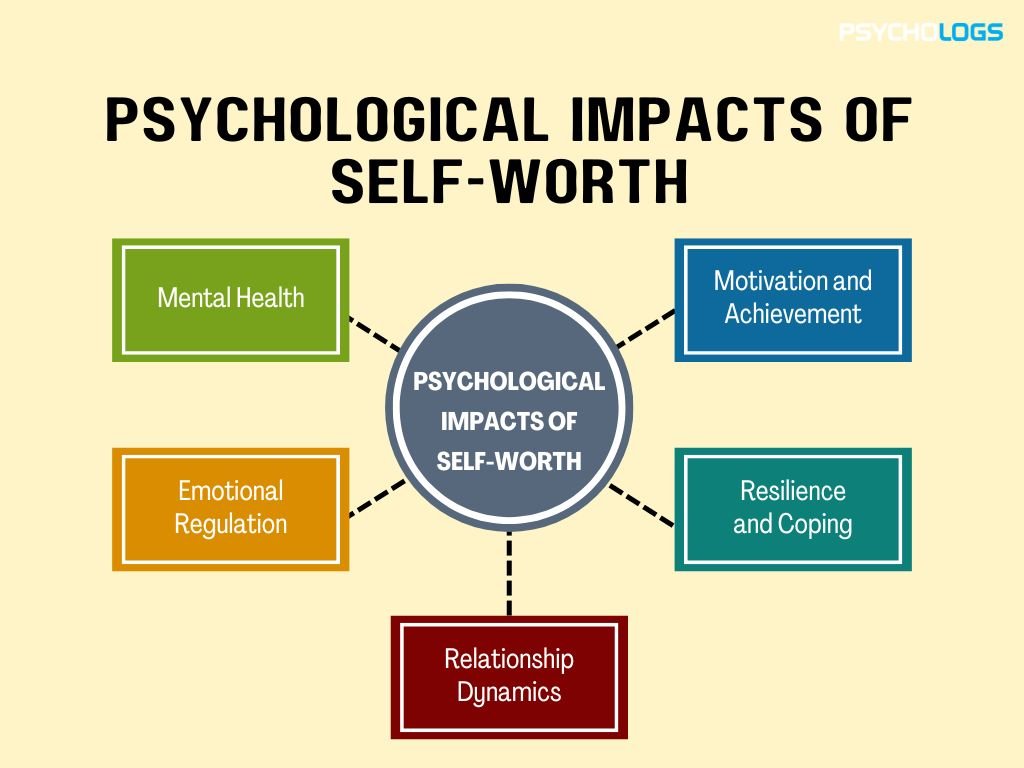Sarah, a 25-year-old, works as a marketing executive in the Nicolas company. She works from 9 am to 6 pm and doesn’t get enough leave. Even though she worked hard, she still feels low self-esteem and criticises herself, due to what she experienced in her childhood. After reaching a counsellor, she started to challenge her negative thoughts and focused on self-compassion, positive affirmation and confidence. This led her to come out of the negative world and become more confident and professional in life. Just like Sarah, everyone in our lives has experienced this phase of life. We may go through it by talking to a friend, doing exercise, or doing any activities that we like, and so we get rid of it.
What is self-worth?
According to APA, self-worth is defined as “an individual’s overall evaluation of themselves as a valuable and capable human being deserving respect and consideration. ”( APA Dictionary of Psychology, n.d.) Positive feelings of self-worth tend to be associated with a high degree of self-acceptance and self-esteem. The relationship between psychology and self-worth is a difficult one, as it plays a major role in every aspect of human life.
From a psychological perspective, self-worth is developed or shaped by various factors, such as childhood experiences, social interaction and cultural norms. Positive self-worth can increase confidence levels, motivation and give the ability to do and achieve anything, while negative self-worth leads to poor mental health and creates a bad self-image, which the individual hides from society (Shultziner & Rabinovici, 2011).
Key Elements That Shape Self-Worth
As self-worth is a multifaceted concept, it includes various components, including
- Self value: It is the ability to which you have inherent self-worth and deserve to be served with kindness and consideration from others and yourself. For instance, David acknowledges his strengths and weaknesses and reminds himself that even though he has some flaws, he is worthy of love and respect.
- Self-respect: It’s all about treating yourself with kindness, dignity and consideration and about valuing yourself and your worth in all situations. For example, Emily prioritises her self-care by getting enough sleep, eating healthy foods regularly and respecting others, which in return helped her improve her mental and physical health.
- Confidence: It is where you trust your abilities and the capacities you have in handling situations. For example, Sophia prepared for the presentation and when she started to gain a little trust, which led her to present it confidently and engage in talks.
- Self-efficacy: It’s about believing in your abilities to accomplish tasks and achieve goals. For example, John sets a realistic goal to lose weight; he does it by breaking it down into achievable tasks. He believed in his ability to succeed and stay consistent in achieving his goals.
- Self-love: It is all about having a positive self-image of yourself, such as body appearance, the way you walk, and so on. For example, Priya loves to take care of herself by engaging in yoga, pilates and mindfulness. She shows love and compassion.
- Self-compassion: It is where you respond to yourself with kindness and understanding in any life challenges or mistakes. For example, Kevin treats himself with kindness and consideration for his mistakes, as he would treat his friend.
Self-worth is not fixed and can be developed by various factors of life experience, relationships, societal influences and beliefs towards ourselves. (Self-worth – Immersive Psychology Group, n.d.)
Understanding The Difference Between Self-Worth and Self-Esteem
Self-worth is known as the values and dignity you give to yourself, which creates happiness and joy. While self-esteem, on the other hand, is the overall evaluation of yourself, both strengths and weaknesses and in relation to how you perceive yourself in an environment. The Major Key Differences are:
- Self-worth is Inherent, and self-esteem is Evaluative.
- Self-worth is based on Internal(skincare, yoga, affirmations) while self-esteem is External (life experiences).
- Self-worth is mostly unconditional, while self-esteem is conditional, as it is based on achievements or validation from others.
For example, Maya, a 29-year-old talented artist, values her creativity and self-expression. Her self-worth is mostly inherent value as a person, and she does seek others’ validation. However, when she receives positive feedback and appreciation, her self-esteem gets boosted up and on the other hand, when she faces criticism or rejection, her self-esteem goes down.
How self worth is self-worth being shaped?
Some factors may influence the shaping of self-worth. By understanding these factors, you can help to identify the areas where you need to make adjustments to cultivate a healthier sense of self-worth.
1. Childhood Experiences
Individuals who experienced different Parenting styles, trauma, and early life experiences play a significant role in shaping self-worth. Children who received positive reinforcement tend to have high self-worth, and those who rely on the support and validation from others are more likely to develop a low sense of self-worth.
2. Social Media and Societal Expectations
Social media portrays unrealistic expectations and comparisons of other individuals, which can lower the ability to develop self-worth. It is platforms can often provide edited versions of others’ lives, making us feel that we are inadequate or unworthy.
3. Relationships
The individual with Romantic relationships, friendships, and family dynamics can influence our self-worth. Having Positive and supportive relationships can enhance our self-worth, while toxic or abusive relationships can damage it.
4. Achievements and Failures
Successes and failures can impact our self-worth, with failures often leaving a more significant impact on individuals. It is how we respond to failures and achievements that either reinforce or undermine our self-worth.
5. Internalised Messages
When we start to internalise our thoughts and messages from life experiences, family or Romantic relationships, and other societal expectations, it can either support or undermine our self-worth. Positive self-worth can be developed by having a good self-image, not expecting from others, while negative self-talk, self-doubt, and self-criticism can contribute to a diminished self-worth.
6. Cultural and Societal Norms
The place where we live, both Societal and cultural norms, can influence our self-worth by creating unrealistic expectations and standards. For example, in some countries, having a perfect body is the ideal goal and is considered beautiful, while individuals who don’t achieve it are considered ugly, which lowers their self-respect. Recognising and challenging these norms can help in developing a more authentic and compassionate sense of self-worth. (Malik, 2024b)

Psychological Impacts of Self-Worth
- Mental Health: Mental health refers to the overall well-being of the individual. When we experience Low self-worth is linked to depression, anxiety, and emotional instability, while high self-worth acts as a buffer against mental health issues.
- Emotional Regulation: Emotionally regulated individuals report that they have high self-worth and know how to manage their emotions, and individuals who struggle with low self-worth experience emotional dysregulation creates the inability to express themselves in situations.
- Relationship Dynamics: A Relationship is often a main phase in an individual’s life. Self-worth can help build trust, communication, and intimacy in relationships. Individuals with high self-worth create healthy relationships, and low self-worth lead to dependency or isolation.
- Motivation and Achievement: Self-worth is often derived from intrinsic motivation, goal-setting, and academic or professional success. People with high self-worth tend to have more confidence and encourage others, and people with low self-worth tend to have a fear of failure in all situations.
- Resilience and Coping: Resilience means bouncing back from a situation, and it means sticking with it and coping means having a way of handling situations at all times. People who have high self-worth increase resilience and adaptive (healthy)coping skills, while low self-worth doesn’t allow them to move on and creates stress and trauma effects.
Strategies for Building and Maintaining Self-Worth
Strategies refer to some techniques or ways in which we can build and maintain our self-worth. It requires focused effort, self-awareness, and a willingness to challenge negative self-talk and behaviours. Some strategies to help you are :
1. Practising Self-Compassion daily
When we start to treat ourselves with kindness, understanding the situations and being patient at all times. Acknowledging our imperfections and reminding ourselves that everyone makes mistakes, and there is nothing wrong with it. This mindset helps in developing high self-esteem. For example, Emma, a mother of two children, forgot to take her kids from school. She didn’t beat herself up; instead, she acknowledged that everyone makes mistakes and it is ok.
2. Developing a Growth Mindset
An individual should view challenges as opportunities for growth and learning. They should focus on progress and not perfectionism. Having a growth mindset helps in developing high self-worth. For example, David, a businessman, faced a huge loss last month. He didn’t feel bad and thought of it as a stepping stone, and learnt to improve and get feedback from his experts.
3. Setting Realistic Goals and Celebrating Achievements
In psychology, it is called as “chunking”, where you break down large goals into smaller and achievable tasks. Which helps you do all the big tasks in no matter of time. Celebrate your successes, no matter how small or big they seem, as it helps to develop high self-worth. For example, Emma, a novelist focused on writing a novel per year, didn’t rush herself; instead, she wrote each chapter for a month, which helped her to achieve her goal.
4. Surround Yourself with Positively Influencing People
When we spend time with people who support and encourage us, we get a positive vibe and increased motivation and confidence, and we feel energetic. We should avoid having negative talk, toxic relationships with others, which will drain our energy and make us feel fatigued. For example, Rachel and emerging artists tend to surround people with positive influences, which makes them feel good and achieve their dreams as artists.
5. Embrace Imperfections and Vulnerabilities
Recognising that nobody is perfect and has flaws. We should embrace our quirks and vulnerabilities(weaknesses), and this is what makes us feel unique. For example, Jack, a school student, joined a spoken English competition, spoke for the first time. He felt nervous and mistakenly pronounced a word wrongly, instead of “but”, he said “dad,” and he reminded that everyone makes mistakes and it’s completely ok.
6. Practising Mindfulness and Taking care of yourself
Taking care of our physical, emotional, and mental well-being and engaging in activities that bring joy and help us relax can lead to improved Self-Worth. For example, Emily, a professional artist, tends to spend time on herself, like skincare, bodycare, yoga, and pilates. When she put herself in the first place in everything, it helped her to have higher self-worth.
7. Challenge the Negative Self-Talk
You must notice when you speak negative self-talk and challenge those thoughts by reframing them in a more positive or realistic light. In this way, it helps in reducing the negative thoughts and developing the positive ones and creates a greater impact. For example, Arun, an athlete, lost his match in a recent event. His thoughts started to make him feel that “you are a waste” and “ you didn’t put enough effort”. After reaching a counsellor, he started to reframe it positively by “I did great and I’ve given my best“.
8. Developing Self-Awareness
You should have a good understanding of your values, strengths, and weaknesses and recognise your emotions and the ways they impact your behaviour. For example, Laura, a college student, takes time to reflect on her strengths and weaknesses, which eventually led her to develop self-awareness.
Overcoming Self-Worth issues and ways to get help
Overcoming self-worth requires a lot of effort and the willingness of the individual to confront and challenge negative thought patterns, behaviours, and emotions. Some common self-value issues and strategies for overcoming:
1. Low Self-Esteem
Individuals who don’t have enough confidence, understanding about themselves develop low Self-value. Instead, focus on yourself by building self-compassion and challenging negative self-talk, which develops a growth mindset and helps people.
2. Self-Doubt
Individuals around the age of 17-19 tend to self-doubt in all areas, which creates low self-worth. These people can practice self-reflection, identify areas of strength and weakness, and develop a plan to build confidence in areas where they feel uncertain.
3. People-Pleasing habit
Setting healthy boundaries, practising assertive communication, and prioritising your own needs and desires can help prevent the ‘people pleasing ‘ habit. Instead, this prioritisation leads to creating confidence and a sense of identity.
4. Having a perfectionist mindset
You should develop a growth mindset, focus on your progress rather than Perfectionism, and practice self-compassion daily when you make mistakes. You should keep in mind that “everyone makes mistakes and it’s common”. And so it creates high self-value and an improved sense of being.
5. Seeking Professional Help when you feel you can’t do anything
If you tend to struggle with self-worth issues for a longer period. It is best if you seek help from a mental health professional counsellor, a psychiatrist, or other professionals. They can help in providing with personalised guidance, support, and strategies to help you build a more positive sense of self-worth.
Conclusion
Self-worth is said to be a vital aspect of our overall well-being, which influences our relationships, motivations, and resilience. Understanding the importance of self-worth and implementing strategies to build and maintain a positive sense of self-worth can help cultivate a more compassionate, confident, and authentic sense of self. Building self-worth is a journey, not a chapter of our lives. It requires patience, kindness, and compassion. Be gentle with yourself, and don’t be afraid to seek help when you need it. With time and effort, you can develop a more positive and resilient sense of self-worth.
FAQs
1. Define self-worth and why it is important.
Self-worth means the values and respect we have for ourselves. It’s like taking care of ourselves -skincare, body care, yoga and pilates and it’s essential in our life because it influences our relationships and interactions, provides positive impacts on mental health and well-being. Helps in building resilience, coping skills, confidence, decision-making making and goal-setting skills
2. What are the strategies to build and maintain self-worth?
Some strategies include those that help in both building and maintaining self-worth. The individual needs to follow this daily as a routine. Practising self-compassion, developing a growth mindset and focusing towards the future, setting realistic goals and celebrating achievements and surrounding yourself with positive people, embracing imperfections and weaknesses, practising mindfulness techniques and prioritising self-care over bad habits, Challenging negative self-talk with positive ones and developing self-awareness
3. What are the signs that I may need to seek professional help?
Some of the signs are here, and if you are experiencing them for a prolonged time, you need to seek professional help. They are:
- Negative self-talk
- Low level of self-esteem
- Self-destructive behaviour (breaking things and hurting themselves)
- Trauma or past experiences impacting our self-worth
- Difficult in forming and maintaining relationships
- feelings of anxiety or depression
4. How can I apply the self-worth principles in daily life and relationships?
These principles can be applied in your daily life to increase your self-worth, and they are :
- Practice self-care
- Set healthy boundaries
- Communicate assertively and
- Start to Prioritise self-awareness
- Surrounding yourself with positive influences
5. What other modes of resources are available to help me build and maintain self-worth?
Some resources help you in building and maintaining self-worth; they are :
- Therapy or counselling sessions
- Self-motivation books or life lesson books
- Online certificate courses or workshops
- Support groups
- Mobile apps, such as Happify or Calm
References +
- Malik, P. (n.d.). Understanding Self-Worth in Psychology. The WellReads. https://thewellreads.com/articles/understanding-self-worth-psychology/
- https://positivepsychology.com/self-worth/
- Self-worth – Immersive Psychology Group. (n.d.-b). Immersive Psychology Group. https://www.immersivepsychologygroup.com/we-help-with/attachment-work/self-worth/#:~:text=Key%20components%20of%20self%2Dworth%20include%3A&text=Confidence%3A%20Confidence%20in%20one%27s%20abilities,friend%20in%20times%20of%20difficulty
- Website. (n.d.). Understanding Self-Worth from a Psychological Perspective Part 1. https://www.gipshospital.com/. https://www.gipshospital.com/understanding-self-worth-from-a-psychological-perspective-part-1#gsc.tab=0
- Antle, B. J. (2004). Factors Associated with Self-Worth in Young People with Physical Disabilities. Health & Social Work, 29(3), 167–175. https://doi.org/10.1093/hsw/29.3.167
- Crocker, J. (2002). Contingencies of Self-Worth: Implications for Self-Regulation and Psychological Vulnerability. Self and Identity, 1(2), 143–149. https://doi.org/10.1080/152988602317319320
- APA Dictionary of Psychology. (n.d.-b). https://dictionary.apa.org/self-worth













Leave feedback about this